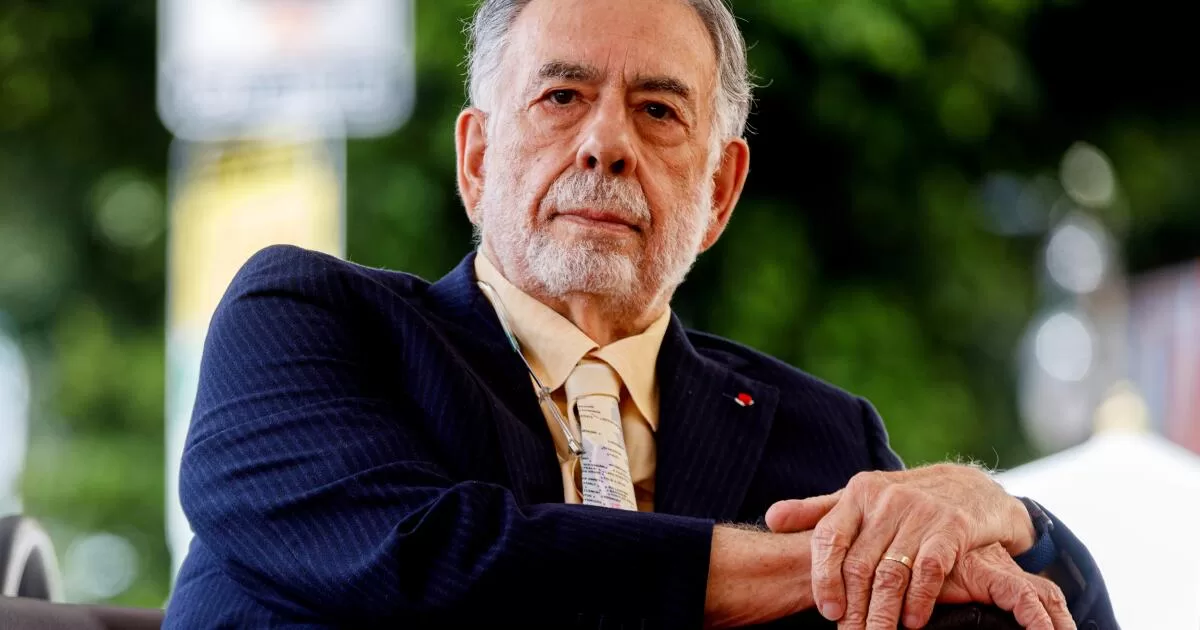“I don’t care. I never cared,” Coppola said when asked about the reported $120 million fortune he sunk into the film. ““The money doesn’t matter. What’s important are friends.”
Those friends, along with sister Talia Shire, son Roman Coppola and granddaughter Romy Mars, flanked “The Godfather” and “Apocalypse Now” filmmaker on the dais and in the making of the film, on which he credited his cast and crew as co-directors — and star Adam Driver as one of its most active co-editors.
As for Hollywood, which has largely scratched its head at “Megalopolis” according to reports on early screenings for potential buyers, Coppola had less friendly words: “I fear that the film industry has become a matter of people being hired to meet their debt obligations,” he said, noting that he’d be open to a streaming platform as U.S. distributor but preferred to see the film receive a theatrical release. “Their job is not to make great movies but to meet their debt obligations.” (The film will have an IMAX release, a representative confirmed to The Times on Thursday, but the specifics remain unclear until it secures Stateside distribution.)
“Megalopolis” stars Driver as ambitious architect and inventor Cesar Catilina, who hopes to use his discoveries — such as a powerful new material, Megalon, and the power to stop time — to create a utopia, Megalopolis, in place of the decaying “New Rome” (think contemporary New York City with a Caesar haircut). Arrayed against him are Mayor Franklyn Cicero (Giancarlo Esposito), a machine politician desperate to protect his status; Clodio Pulcher (Shia LaBoeuf), the dissolute grandson of a business magnate who turns to violent populism to shore up his power before a takeover; and Catilina’s ex-mistress, amoral fame-seeker Wow Platinum (Aubrey Plaza), who teams up with Pulcher to get her revenge.
And let me be clear: “Megalopolis” is much, much stranger than the above synopsis — or even the name Wow Platinum — could begin to suggest. (One of the most remarkable moments features a person with a microphone walking onto the stage of the cinema and posing a question to Driver during a press conference scene, which he proceeds to answer.)
Driver, Plaza, Esposito, Laurence Fishburne and Nathalie Emmanuel, who plays Catilina’s love interest and Cicero’s daughter, all suggested that the creative process mimicked what Plaza called the “dreamlike” nature of the script.
“It was challenging at times to sort of walk towards my character, because I was trying to see her in the way that Francis had envisioned, and there was a journey for that,” Emmanuel said, comparing the experience to a musician being conducted.
“Getting into his mind was kind of a trust fall,” Plaza added.
What Driver described as the director’s generous approach on set extended to the dais, as Coppola — the day’s main attraction — repeatedly attempted to bring his cast into the conversation. He toss one question about the film’s politics to conservative Jon Voight; at another Fishburne fielded another for him. “Please ask my sister Talia [Shire] a question,” Coppola asked at one point.
Perhaps the most highly anticipated film of the entire festival, “Megalopolis” came into Cannes with a back story worthy of, well, “Megalopolis.” Its cost partially defrayed by the sale of several of his wine businesses, Coppola’s allegorical drama, littered with allusions to Sappho and “Entertainment Tonight,” John Wilkes Booth and Elvis, emerged to criticism as soon as it screened for buyers in March. “There is just no way to position this movie,” one distributor told The Hollywood Reporter.
Coppola intimated that he was prepared for this reaction, and undeterred by it: “I knew the film was not like other films that were out,” he said. “It’s how I felt the film should be and since I was paying for it I felt entitled.”
Since then, the headlines have had less to do with the film’s box-office prospects than conditions on set. On Tuesday, U.K. newspaper The Guardian published a lengthy story on the film, detailing a production “almost as fraught and chaotic as ‘Apocalypse Now,’” a shoot so notorious for its challenges it inspired an accompanying documentary about them, the late Eleanor Coppola’s “Hearts of Darkness.”
More worryingly, the Guardian alleged that the director “pulled women to sit on his lap,” and “tried to kiss some of the topless and scantily clad female extras” during a nightclub scene. “Megalopolis” executive producer Darren Demetre told THR that he was “never aware of any complaints of harassment or ill behavior during the course of the project,” and explained Coppola’s conduct “as kind hugs and kisses on the cheek” designed to “inspire and establish the club atmosphere.”
When the film finally premiered in competition here Thursday, it unsurprisingly polarized critics, who described it alternately as the incoherent boondoggle of a grandiose director well past his prime and an invigorating, late-life paean to the possibilities of cinema from one of the art form’s greatest practitioners.
“[Coppola]’s going out not with something tame and manicured but with an overstuffed, vigorous, seething story about the roots of fascism that only an uncharitable viewer would call a catastrophe,” Times film editor Joshua Rothkopf wrote in his Cannes review. “It may be the most radical film he’s ever done.”
As for the filmmaker himself, however, he does not appear to be treating “Megalopolis” as a closing statement, alluding to a scene he’d like to add to “The Godfather” and revealing that he is already at work on his next screenplay. (“I’ll be here in 20 years,” he said, not entirely joking, when asked whether he’d consider returning to “Megalopolis” to re-work it.) Still, Coppola is satisfied with his list of accomplishments, even if he’d like to lengthen it.
“I got to see my daughter [Sofia Coppola] win an Oscar and I got to make wine,” he listed among them. “I got to do so many things that when I die I won’t notice it.”
